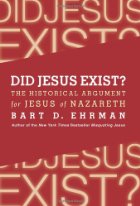
The following translation of Hermann Detering’s review of Bart Ehrman’s Did Jesus Exist? has been sent to me and I am thrilled to be able to make it available on this blog. It is over 7000 words, too long, I think, for a blog post, so I am posting here just the first part of the review. The rest to follow. I have modified the translation in a few places to make it flow easier and to iron out some obscurities. I have also replaced the English translation of Detering’s German language quotes of Ehrman’s words with the original English versions. All hyperlinks and notes in the “*see also” inset box are my additions, as also are the images. Endnotes are Detering’s, of course, and I have relocated these in other inset boxes, too.
Prof. “Errorman” and the non-Christian sources
 1. Bart Ehrman’s book, Did Jesus exist?
1. Bart Ehrman’s book, Did Jesus exist?
The introduction to the book ushers us into the following scene: Bart D. Ehrman, PhD, Distinguished Professor at the University of North Carolina at Chapel Hill, actually wanted to write a completely different, more important work, namely about how a Jewish end-time prophet named Jesus became a divine being or God. But then he was startled by some emails. He suddenly found himself taken up by a scene that was apparently unknown to him until then: Mythicists who appealed to his authority for their claim that there had been no Jesus! Reason enough for a conscientious “New Testament scholar” to take a closer look at the matter.
Although Ehrman had by then read “thousands of books about Jesus in English and other European languages, the New Testament and early Christianity,” he was “like most colleagues completely unaware of the extent of sceptical literature [on the subject]” (p. 2). For a professor of theology and biblical scholar who should be up to date and in daily conversation with his students, this long phase of ignorance is astonishing enough, especially since the question of the historical existence of the man from Nazareth must have occurred again and again in the mass of Jesus literature he read. For example, in The Quest of the Historical Jesus by Albert Schweitzer, often quoted by Ehrman, in which this very subject is dealt with on many hundreds of book pages. This book and others should at least have curbed Ehrman’s boundless surprise and shown him that the question “Did Jesus exist?” is not an entirely fanciful one, and that New Testament research has been periodically occupied with it. Moreover, it is not just since yesterday that the question has been on the agenda of those American “humanists” who read his books and with whom, according to his own statement, he has been in contact for a long time.
However, not everything Ehrman writes should be taken quite so literally. The reader of his book, which is written in a casual conversational tone, has to get used to this and other contradictions. The “casual conversational tone” is not meant as hidden criticism: one should be grateful for the good readability, especially since it saves German readers with “mediocre” English skills a lot of reference work in the dictionary. The fact that the casual presentation and simple language always turns into pure superficiality is, of course, the other side of the coin that we still have to get to grips with.
Instead of immediately shining with new perspectives and objective examination of the mythicists’ theses, Ehrman deals with the mythicists and – again and again with pleasure – with himself. Ehrman about Ehrman – a broad field… The professor strives for clear demarcation:
* see also:
these deniers of Jesus are at the same time denouncers of religion — a breed of human now very much in vogue. Ehrman, Bart D. 2012. “Did Jesus Exist?” HuffPost (blog). March 20, 2012. https://www.huffpost.com/entry/did-jesus-exist_b_1349544.
Richard Carrier is one of the new breed of mythicists. Ehrman, Bart. 2012. “Fuller Reply to Richard Carrier.” The Bart Ehrman Blog (blog). April 25, 2012. https://ehrmanblog.org/fuller-reply-to-richard-carrier/.
this rare breed . . . comprises a growing cadre . . . Ehrman, Bart. 2012. “Did Jesus Exist? The Birth of a Divine Man.” The Bart Ehrman Blog (blog). May 11, 2012. https://ehrmanblog.org/did-jesus-exist-the-birth-of-a-divine-man-for-members/.
There — the “breed” (Ehrman in an interview*) of mythicists, a shadowy group that shies away from the light, concocting dark conspiracy theories in the worldwide channels of the network. With a few exceptions, neither academic degrees nor titles legitimize them to make a meaningful contribution to the difficult historical and religious-historical problems with which Professor Ehrman and his peers have struggled for decades at the forefront of science. In addition, loud, brash and aggressive in appearance, enemies of religion, atheists, and thrown from cliff to cliff by half-knowledge, stupidity and error. Avanti Dilettanti!
Here — the “New Testament scholar”, in the full splendour of his academic titles, honours and prizes, among his numerous students, whose questions he answers conscientiously and competently, proven author of numerous non-fiction books, who as such receives tons of e-mails (“Like most authors, I receive tons of e-mail”, p. 94) (apropos, how do you actually weigh e-mails?). A textbook example of biblical scholarship and theology as he is – imbued with his subject matter, which includes reading the Bible by him daily in the original Greek or Hebrew; who has been studying and teaching for over 35 years and “I don’t plan to stop any time soon” (p. 36). Yes, why should he? Does anyone want to stop him? The mythicists for instance?!
And yet no apologist! Ehrman wants to be understood as a pure historian, who is only interested in historical evidence. “I am not a Christian, and I have no interest in promoting any Christian cause or agenda. I am an agnostic with atheist leanings and my life and views would be approximately the same whether or not Jesus existed… The answer to the question about the historical existence of Jesus will not make me more or less happy, content, hopeful, likable, rich, famous, or immortal” (p. 5f).
[1] “Jesus has existed”, 2x, “Jesus has existed”, p. 6, “he certainly lived”, p. 37, 2x, “has certainly existed”, p. 173, “had a real historical existence”, p. 92, “was a real man … a man of flesh and blood”, p. 117, “really lived”, p. 177, “he lived”, p. 185, cf. p. 204, and finally the final sentence: “Jesus existed, whether we like it or not”, p. 339
[2] Bart D. Ehrman re: Did Jesus exist on NPR’s All Things Considered. https://www.npr.org/transcripts/149462376?t=1592237446871
With these words Ehrman sets aside all suspicions that could possibly arise in answering the question “Did Jesus exist?” — all bias is set aside. No, this man is not only competent, not out for sensation or filthy mammon, like most book-writing deniers of the historical Jesus, but completely unbiased, a selfless fighter for historical truth. This is the point of view that the book, with its the suggestively repeated thesis “Jesus certainly / actually / really lived!”, should be understood [1]. “From a dispassionate point of view, there was a Jesus of Nazareth” (p. 7)
But wait! Wasn’t there a recent interview where Ehrman postulated: “Jesus’ teachings of love, and mercy and forgiveness, I think, really should dominate our lives, on the personal level, I agree with many of the ethical teachings of Jesus and I try to model my life on them, even though I don’t agree with the apocalyptic framework in which they were put.” [2]
But for now, let’s take it from Ehrman that he approaches the matter without prejudice, even if the tone he takes in his book and in previous interviews against the mythicists whom he compares with Holocaust deniers (p. 5) sounds a little too irritable and rude by academic standards. The intention to examine without prejudice the question of the existence of the man from Nazareth deserves respect in any case. Respect for the other’s opinion and good academic manners should, however, also dictate that good will in the search for historical truth should not be denied to the other side. What counts in the end anyway is not only the good intentions or the respective ideological background, but the better historical arguments.
It is of course correct that there are also quite big differences in quality among the publications of the “Christ-mythicist”. It is clear that the arguments with which Acharya S. D. M. Murdock, for instance, presents her theses in books like The Christ Conspiracy: The Greatest Story Ever Sold (!) etc., are not always able to convince a professional biblical scholar. Also, the Jesus Mysteries of the author duo Freke-Gandy contain historically highly problematic and partly quite outdated theses. A number of errors and sloppiness in both books cannot be overlooked. And yet, of course, it would be completely absurd to generalize the picture that emerges from them and apply it to all “mythicists” or radical critics. By this method, Ehrman could be lumped together with the author of the Da Vinci Code, since both authors are obviously convinced of the historical existence of the man from Nazareth. Mythicists could now claim that the thesis that Jesus existed is absurd, if only because Dan Brown and other bestselling authors continually presuppose his existence in their books. Logic according to Ehrman’s sense…
The accusation repeatedly made by Ehrman in interviews against Timothy Freke and other mythicists that they deny the existence of Jesus only to sell books is disingenuous. As a man of honor, Ehrman should rather be thankful to them for the fact that their books gave him the opportunity to sell a public bestseller himself, even with his own trailer (see his Facebook page). If he himself were only interested in the unselfish dissemination of his ideas, he could put his book as a pdf file on his website for free.

As for the claim that “mythicists” generally do not possess a theological or other doctoral or equivalent title that would legitimize them for the work, Ehrman himself knows and names exceptions, e.g. Robert M. Price, Richard Carrier or Tom Harpur. He could have included Darrell Doughty, whom I admired so much and who unfortunately died all too soon. With Google’s help and a quick glance across the pond, the author of these lines might have come to his mind, who since his dissertation in 1992, The Fabricated Paul, 1995, or The False Witnesses, 2011, as well as in many articles on his website and elsewhere, has dealt with this topic and has taken a radically critical position. Worse, however, Ehrman also completely ignores the representatives of the so-called Dutch Radical Critique, whom he should have known from Albert Schweitzer’s book: theologians with doctorates, practising pastors, university lecturers – and most of them deniers of the historicity of Jesus. The last of them, G.A. van den Bergh van Eysinga, “Grand Master of Radical Criticism”, died in 1957.
Well, that too was a while ago. And yet a glance at these honorable gentlemen who by definition must be uneducated dilettantes and fanatical atheists could have cured Professor Ehrman of his obsession with denying the historical Jesus. Ignoring these radical critics of the New Testament does not bear good testimony to the research work of the American professor. As a professional biblical scholar, Ehrman should not spend too much time dealing with easy opponents like Acharya or Freke-Gandy, but – so much self-confidence is needed! – to fight against equal sparring partners.


Apparently Ehrman wants to deduce already from the mere marginal existence or non-existence of mythicists at the biblical science / theological faculties that their theories are nonsense. But since when is the question of (historical) truth decided by majorities? Have not all new theories once started small and often had to face bitter resistance and academic conceit? And is the thing with the unhistorical Jesus really so abstruse that it does not find academic teachers who take pity on it? Obviously not, because how else – according to Ehrman’s own statement – could it infect more and more people, so that scepticism threatens to become more and more a phenomenon of our culture? Is the problem not rather that candidates for the theological chair – apart from the scientific qualification – must still today fulfil certain theological and ideological basic conditions and prerequisites? The case of Lüdemann was, at least for German theologians, a quite revealing eye-opener. One could also learn from the case of Mohammed Kalisch. Against this background Ehrman’s omissions must appear either completely thoughtless or cynical.
But after this banter, to which Ehrman’s strange fixation on silly accessories such as doctorates and other academic vanities seduces again and again, let us turn to the real issue, i.e. the arguments for and against. It is astonishing enough that Ehrman needs about 370 pages to refute a thesis which he considers to be scientifically absolutely unfounded. After his interviews and introductory remarks, one would expect that a few sentences or psychiatric reports would have sufficed.
Next: 2. Pliny the Younger
The original article by Detering is at http://radikalkritik.de/wp-content/uploads/2017/07/Ehrman_Kritik.pdf
Neil Godfrey
Latest posts by Neil Godfrey (see all)
- What Others have Written About Galatians (and Christian Origins) – Rudolf Steck - 2024-07-24 09:24:46 GMT+0000
- What Others have Written About Galatians – Alfred Loisy - 2024-07-17 22:13:19 GMT+0000
- What Others have Written About Galatians – Pierson and Naber - 2024-07-09 05:08:40 GMT+0000
If you enjoyed this post, please consider donating to Vridar. Thanks!

Lmao.
I met Bart Ehrman and told him about my book, which explains how Mark made up the story of Jesus. He was quite respectful and courteous. I think the problem is that Ehrman and other NT scholars are members of what I call the Jesus Guild. Scholars who have devoted their careers to analyzing Jesus, whatever their viewpoint, have little incentive to question the historical existence of their object of interest. There is a built-in occupational bias that is not easy to overcome.
Btw, the new revision is out … edited by Dr. Robert M. Price.
The Christ Conspiracy: The Greatest Story Ever Sold – Revised Edition
https://www.amazon.com/gp/product/0990888517/
It’s really good.
Oh, here’s Acharya’s response to Ehrman’s book, DJE:
Bart Ehrman caught in lies and libel?
https://stellarhousepublishing.com/bart-ehrman-caught-in-lies-and-libel/
Detering’s work on the non-Christian sources, featuring new arguments on some of the sources:
• Detering, Hermann (2011). Falsche Zeugen außerchristliche Jesuszeugnisse auf dem Prüfstand (in German) (1. Aufl ed.). Alibri-Verl. ISBN 978-3-86569-070-8
Is brought up per Hermann Detering ap. Martin Bauer (30 September 2011). “Neue Zweifel an der historischen Existenz Jesu”. Humanistischer Pressedienst (hpd) (in German).
Thanks for giving us this, Neil. I love it. Yes, maybe the field of New Testament Studies could benefit from a few psychiatric reports… But seriously, and from a dilettante that Ehrman has lambasted in his writings: I wish that he—and the whole tradition he champions—were better informed in the apocrypha, in non-Christian traditions such as Mandaism, in languages other than Greek and Latin, in Gnosticism, even in Buddhism. Ehrman devoted a few pages of DJE to my Nazareth work, confused pages that show he simply didn’t comprehend (or even read) my work. In another place (NazarethGate p. 152) I take him to task for seeing no difference between “Jesus” and “Christ,” as if these two words were equivalents and (of course!) necessarily referred to one and the same familiar icon of history. So basic. Over the years I’ve never checked a book by Ehrman out of the library because, invariably, a blooper appears on practically every page. Ehrman may be highly skilled in textual and New Testament criticism, but in my opinion his reasoning, judgment, and insight are poor and not what the researcher into Christian origins needs today. I’ve found Ehrman to be quite misleading on bigger questions, even when he happens to be correct in some details. For my money, Brodie, McDonald, Price and Detering are and were better scholars who understand historical context so much better than Ehrman.
For an example of such ignorance about Buddhism, see e.g., https://old.reddit.com/r/AcademicBiblical/comments/hlmnlb/chrestians_vs_chrtians_vs_christians_who_was/fx0trwj/?context=3.
Wherein someone said (with reference to Jesus mythicism) “Odd how nobody ever questions the existence of Siddhattha Gotama aka Buddha.”
I replied “With all due respect, there is scholarship that questions this very thing. For a useful summary of such discussions, see “The Myth of the Historical Buddha: Is Shakyamuni more fiction than fact?” by Bernard Faure (Kao Professor in Japanese Religion at Columbia University and the author of several books on Buddhism, including The Rhetoric of Immediacy: A Cultural Critique of Chan/Zen Buddhism and The Power of Denial: Buddhism, Purity, and Gender): https://tricycle.org/magazine/myth-historical-buddha/.”
There are doubts about Confucius, and even stronger doubts about Lao Tzu.
It would be helpful if you cite some serious works to illustrate each.
Can’t provide much, I’m afraid.
I recall that Watsuji Tetsuro had doubts about Confucius, partly from the fact that the earliest account of Confucius was written about 400 years after Confucius is supposed to have lived. But the people who claim to be his descendants certainly seem to be related.
For Lao Tzu, D C Lau expresses doubts in his translation of the Tao Te Ching.
You can find a bit about the historical problem of Lao Tzu here.
https://plato.stanford.edu/entries/laozi/#LaoSto
That’s interesting. Where have you found him to be misleading?
Salm has answered this several times in various places. One instance: https://vridar.org/2012/05/16/nazareth-rene-salms-preliminary-response-to-bart-ehrman/
For others, search in the Search Box on this site (keywords Salm and Ehrman) and Salm’s Mythicist Papers site: https://www.mythicistpapers.com/
Neil: “But since when is the question of (historical) truth decided by majorities? Have not all new theories once started small and often had to face bitter resistance and academic conceit?”
…Regrettably only a quasi-touché: This is precisely the point early prrachers made arguing FOR a Jesus of Nazareth, born in Bethlehem, crucified under Pilate, experienced by eyewitnesses alive after his death etc., etc. Namely, they argued (successfully, turns out) “…since when is the question of (historical) truth decided by majorities? Have not all new theories once started small and often had to face bitter resistance and academic conceit?”
Versteh?
A. All men have two legs.
B. An ostrich has two legs.
C. Therefore, an ostrich is a man.
A. All truths began with small reception and against opposition
B. The account Jesus rose from the dead began with small reception and against opposition
C. Therefore, the account Jesus rose from the dead is truth.